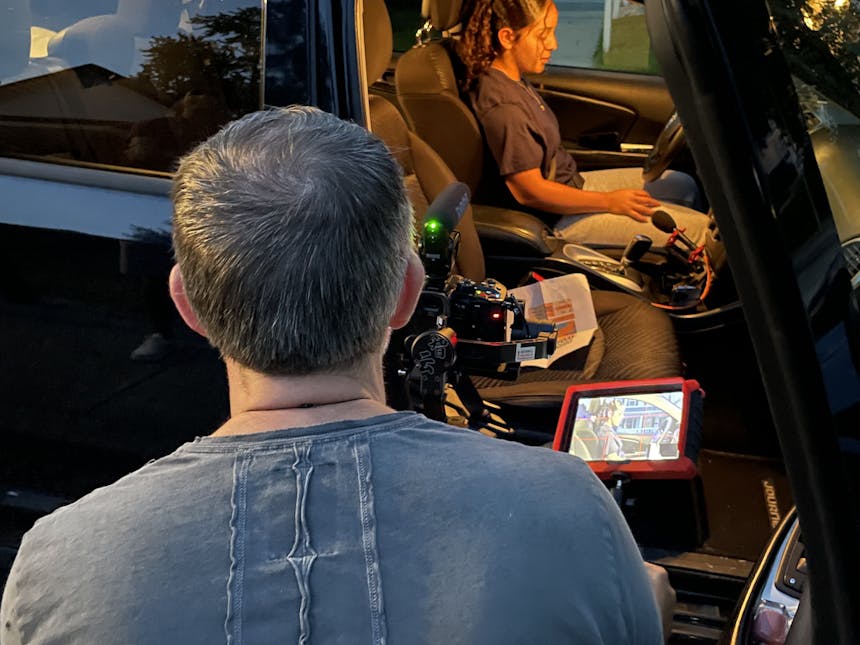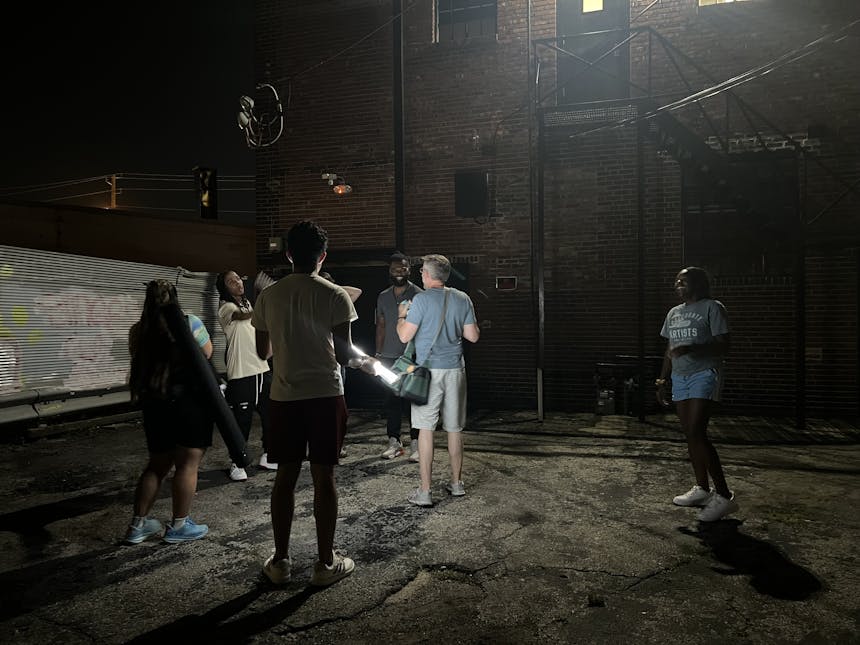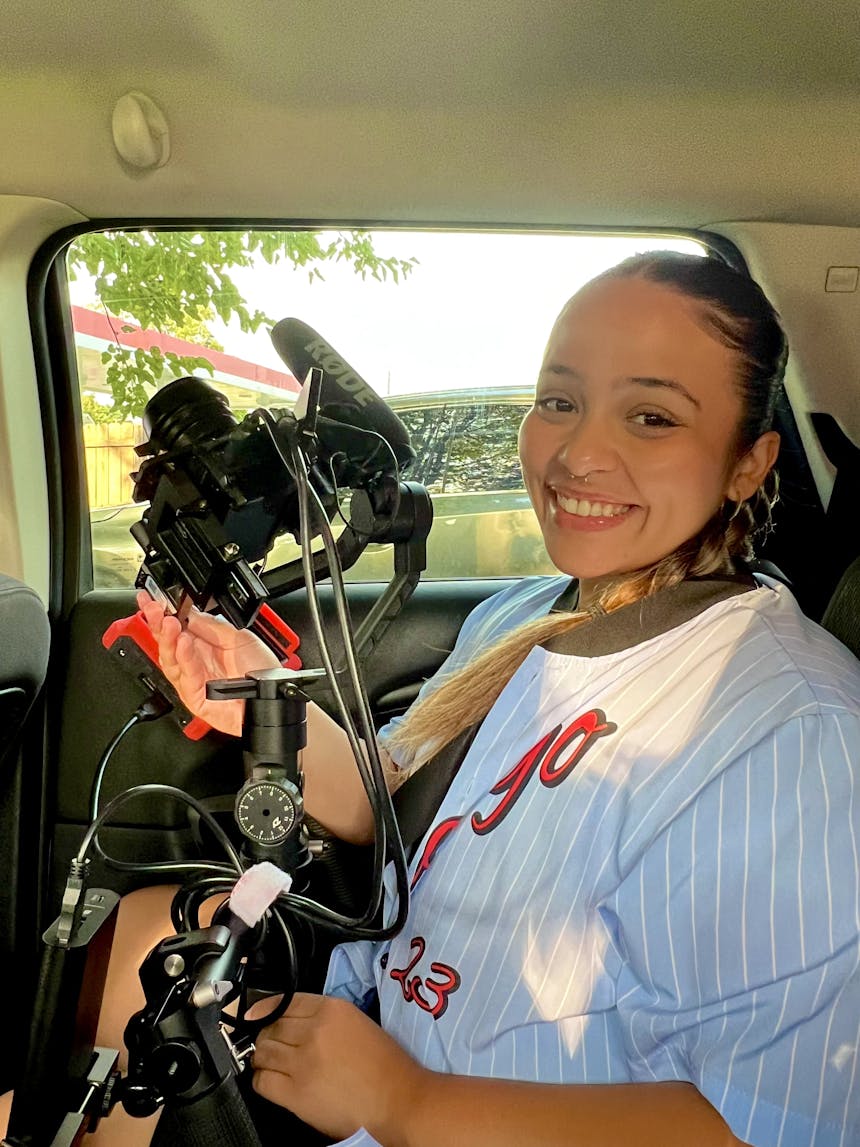With one click
Export a perfectly formatted traditional script.
Mark Steenbarger, founder of Point of View Story, is a filmmaker on a mission: to create short narrative films that inspire deep self-reflection and healing. His latest short films, Betrayal and Burden, offer powerful insights into how deeply held beliefs can shape our lives and relationships.
For Mark, who holds an MFA in Film from the Vermont College of Fine Arts, filmmaking is more than a creative outlet—it’s a tool for transformation. And with the help of SoCreate, Mark has streamlined his filmmaking process, using the platform to collaborate more effectively and bring these meaningful stories to life with ease.
Export a perfectly formatted traditional script.


“Other tools were either too plain (just text) or had too steep a learning curve and were overpriced. SoCreate gives me a sense of storyboarding while also offering a more contextualized view of our dialogue,” Mark explains.
Betrayal and Burden explore themes of betrayal and the burdens we carry with shame or circumstance, showing how they can prevent us from experiencing connection, intimacy, and community. “Our approach in both cases was for the writing team to share their own personal experiences around these themes—being vulnerable with each other—then we saw some common expressions and ideas that surfaced.”
Mark credits SoCreate with helping streamline his filmmaking process, allowing his team to focus on what matters most: storytelling. “The feedback [feature] is huge,” he says. “Also, the way it’s laid out with the scene by scene helps our minds stay focused on that scene rather than looking at a long document in Final Draft.”
One of SoCreate’s key features—adding imagery to each location—helps Mark and his team stay connected to the mood and tone of each scene. “With the imagery for each location, it helps keep us in that vibe/mood to help us write what we’re saying. Also, the way the lines appear associated with the actor (whose actual faces we put in) helps you get a gut check on when dialogue is getting heavy or too long.”

Mark Steenbarger of Point of View Story shoots a scene for a film written with SoCreate.
Instead of pursuing the traditional festival circuit, Mark took a more direct route to share his films—distributing them to a specific audience of subscribers through platforms like Uscreen.tv. “It’s worked out well as it allows us to continue to make short films (12 and counting) while ensuring our films are in front of an audience that we know wants this content,” Mark says. “A more niche/surgical approach versus shotgunning across the entire public and hoping someone finds us.”
This approach mirrors the ethos behind SoCreate’s Storyteller platform, which will soon allow writers to bypass traditional gatekeepers and connect directly with their audience, no matter how niche the subject matter.
Mark’s films serve a greater purpose, particularly for viewers who have experienced harm and violence. His work creates a safe space for people to reflect on their own lives and unlock long-held beliefs.
“We continually hear how viewers are able to suspend their defense mechanisms and take in the ‘slice of life’ happening on the screen to uncover their held beliefs that have been getting in their way,” Mark shares.
One powerful example came from a viewer who had been stuck in therapy for three years. After watching Betrayal, they were finally able to identify and discuss issues that had previously gone unspoken, sparking a breakthrough in their healing process. “Knowing people are finding healing and discovering their true selves is so rewarding and powerful,” Mark says.

Mark Steenbarger of Point of View Story shoots a scene for a film written with SoCreate.
Collaboration is essential to Mark’s creative process, and SoCreate’s feedback features have made it easier for his team to stay aligned. “I really enjoy collaboration. The more eyes and minds are into the script, the more authentic our film will be,” Mark says. He values having actors take ownership of their lines and tweak dialogue to ensure the film feels true to life. “Actors ‘own’ their lines so they can also get in there and tweak the dialogue, ensuring a more authentic film.”
With SoCreate, the collaborative nature of filmmaking is made simpler, allowing Mark’s team to delete unnecessary dialogue and focus on showing rather than telling. “Deleting dialogue is so cathartic and rewarding as it is often an indicator that we found a better way to show it—or we discovered the lines/words aren’t needed.”
Mark’s next project, a short film focused on consent, is already in development. He’s also completed two films on grief, all written in SoCreate. His goal is clear: “Our goal is 2-4 short films a year,” Mark said, adding that SoCreate will continue to be an integral part of his process moving forward.
When asked for advice for aspiring filmmakers interested in using SoCreate, Mark says: “Lean into the imagery you have for your scenes—the images speak more than words. Get more eyes on your script—you don’t have to incorporate everybody’s feedback, but get 3-6 people that will share their insights.”
You can follow the work of Point of View Story on Instagram @PointofViewStory.
For Mark’s full interview, see below!

A team member from Point of View Story, on set shooting.
We create short narrative films that evoke self-discovery of held beliefs that we may not know we carry. Both Betrayal and Burden focus on those moments when, after feeling betrayed, we act defensively in ways that can harm future relationships, denying us connection, intimacy, and quality of life overall. Burden also deals with the shame or circumstances we carry that prevent us from experiencing the kindness of others and the power of community.
Our approach was for the writing team to share their personal experiences around these themes—being vulnerable with each other—then seeing common expressions and ideas surface. We engaged with clinicians and individuals who’ve experienced harm and violence from sexual exploitation, gaining their input. From there, we took our concept and began creating key lines in SoCreate. With the new feedback feature, our team stayed in sync, shaping the dialogue and the imagery of the scenes.
As mentioned above, the feedback feature is huge. Also, the way it’s laid out scene by scene helps us focus on each moment rather than getting overwhelmed by a long document in Final Draft. The imagery for each location helps us stay in the right vibe and mood as we write, and associating lines with the actors (we use their actual faces) gives us a gut check when dialogue is getting heavy or too long.
Yes! We’ve pursued an audience specifically looking for these types of films. We distribute through a third-party platform like Uscreen.tv (which is to streaming what Wix is to websites), and they provide everything needed for a paid subscription base. This approach works well, allowing us to make short films (12 and counting) while ensuring they’re seen by an audience that wants this content. It’s a more niche, targeted approach versus trying to broadcast to the entire public and hoping someone finds us.
We continually hear how viewers are able to suspend their defense mechanisms and take in the “slice of life” happening on the screen to uncover beliefs that have been holding them back. Primarily, these are people who’ve experienced harm and violence from sexual exploitation, but we’re also seeing the justice system use our films to uncover experiences people may not even realize they’re going through. Knowing that people are finding healing and discovering their true selves through our work is incredibly rewarding.
It cements our style of storytelling—where we keep things non-traumatic, with minimal exposition and zero resolution. We want the viewer to put themselves into the film and fill in the missing pieces. This type of feedback validates that this approach is working. Guy Maddin even emailed me, saying he’s “intrigued by this genre of film we seem to have invented,” which was very validating!
I really enjoy collaboration. The more eyes and minds involved in the script, the more authentic our films will be. Creating narrative films, as opposed to documentaries, means coming up with the story, and keeping it authentic is a huge challenge. We’re quick to fall into clichés and stereotypes, but I subscribe to the idea of “show, don’t tell.” SoCreate helps us get eyes on the dialogue early, allowing actors to “own” their lines and tweak them to ensure a more authentic film.
Muse Storytelling used to have a tool I liked, but they discontinued it. Other tools were either too plain (just text) or had too steep a learning curve and were overpriced. SoCreate gives me a sense of storyboarding while also offering a more contextualized view of our dialogue.
Each actor “owns” their lines. I typically write the first draft, but with the feedback feature, the actors come behind me and tweak the lines. We also do in-person read-throughs where we test the dialogue out loud and make changes in SoCreate. The platform’s organization makes it easy to reference past dialogue all in one place.
Lean into the imagery you have for your scenes—the images speak more than words. Get comps for your actors, and name them early on so you can test how it feels to hear their names in your film. Get more eyes on your script—you don’t have to incorporate everybody’s feedback, but having 3-6 people share their insights is invaluable.
We’re actively working on our next concept about consent. We also just finished two films on grief, both written in SoCreate. Our goal is 2-4 short films a year.